

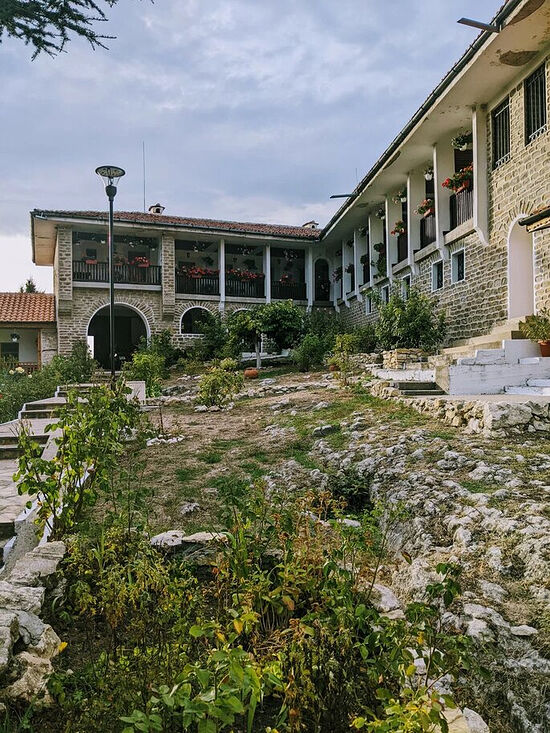
Throughout the Orthodox Christian world, one of the most important and unique aspects of the Orthodox faith can be seen in the numerous monasteries, where a living Gospel is experienced. This experience is open not only to the monastics themselves, who have been called to live the life of the angels (Matt. 22:30)1 but also to numerous pilgrims who can receive spiritual nourishment in these spiritual islands within our increasingly dark modern age. In addition to this, it is widely recognized that monasteries have been vital in creating, preserving, and advancing both religious and secular wisdom from antiquity into the twenty-first century. Nevertheless, it is largely unknown among the Christian faithful how monasticism was transferred from the deserts of Egypt to Europe, and who brought this vital Church institution. Surprisingly, the answer to this question can be found in the modern-day nation of Bulgaria, with it monastery of Zlatnolivadenski, founded in 344 AD by St. Athanasius the Great of Alexandria.
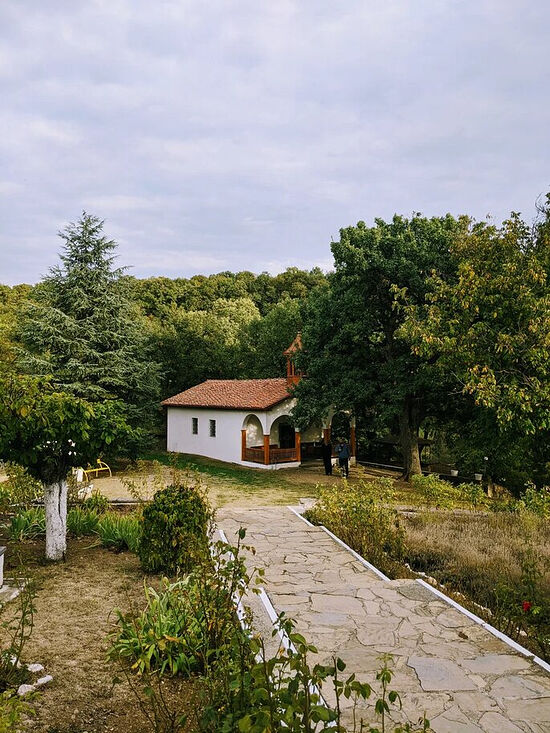
In the autumn of 343 AD, the sons of St. Constantine the Great convened an Ecumenical Council in ancient Serdika (modern-day Sofia), which was attended by 318 bishops from the entire Roman Empire. In a fierce struggle against the heretical Arians, the Orthodox doctrine of the Holy Trinity was confirmed. St. Athanasius was the most prominent figure in this Ecumenical Council, and actively participated in the fight against Arianism. In that period, Mysia and Thrace represented one of the main arenas of the struggle between the two currents of Christianity at that time.
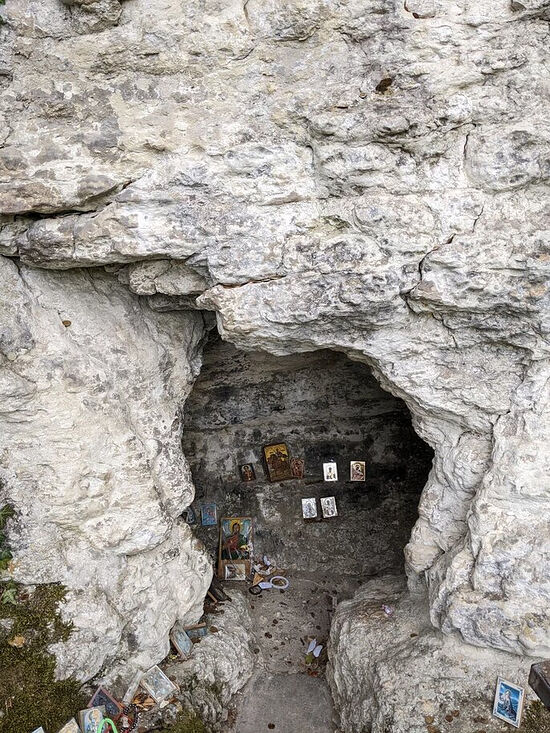
In 344 AD, on his way to Constantinople, St. Athanasius stopped for the night in an old Roman fortress near the village of Zlatna Livada. He found the local Thracian population in terror because of a terrible pandemic that had inflicted them. St. Athanasius remained in this village and secluded himself for fasting and prayer in a rock cave about 300 meters (1,000 feet) from the fortress. (This cave can still be visited by pilgrims in the present day; but tragically during the communist time period, the ownership passed to a local gypsy family.2)
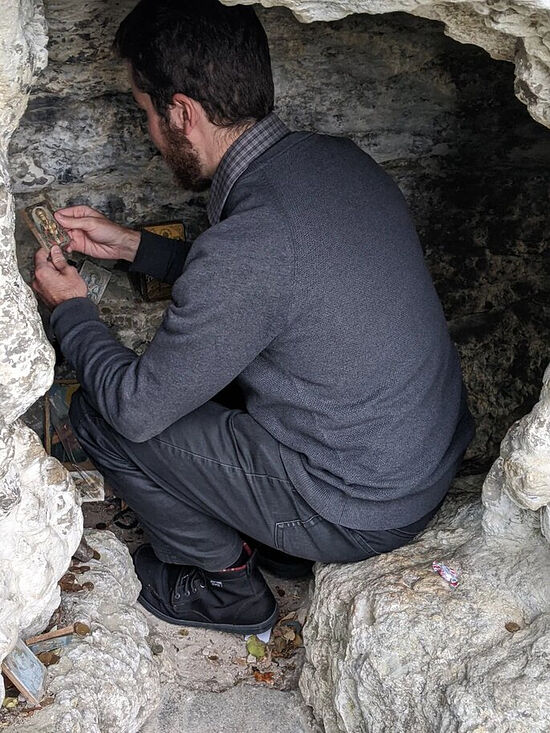
After this time of fasting, St. Athanasius urged the people to build a Church and founded a monastery on the site of an ancient Thracian sanctuary near the main Constantinople-Serdica road. Through God’s great mercy, the epidemic did pass, and the Thracians became devout, truly Orthodox Christians afterward. They did not forget their benefactor, and after his death in 373 AD, the monastery took the name of St. Athanasius. Like many other monasteries, the history after the foundation of the Zlatnolivadenski monastery has been wrought with difficulties, the monastery having been repeatedly demolished and rebuilt. During the Ottoman occupation of Bulgaria, Paisii Hilendarski, Hajdush Voivodes, Vasil Levski, and other fighters for the liberation of the Bulgarian people found shelter in the monastery. After the Soviet takeover of Bulgaria in 1944, the monastery was abandoned and turned into a sheepfold for the local collective farm until the beginning of the 1950s. Then, through the intercession of St. Athanasius, the monastery was saved from this desecration.
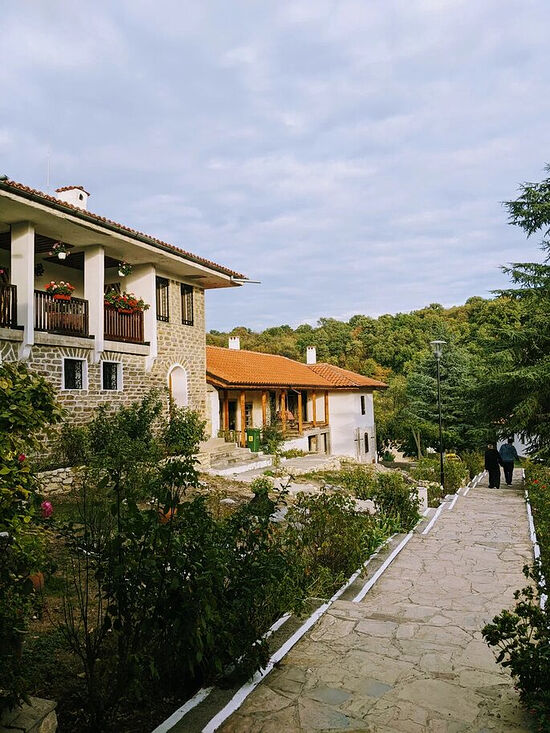
Three nights in a row, an elderly woman from the village saw in a dream St. Athanasius, who insisted that the sheep be driven away from the holy monastery. She told the people in the village, but nobody in those atheist days would believe her. Then the saint appeared to the party secretary with the warning that if he did not stop the insult toward the monastery he would lose his child. Tradition has it that in one night, the monastery was cleaned and made ready for service. The first major modern improvement of the Zlatnolivadenski Monastery was carried out in 1981 at the personal initiative of Lyudmila Zhivkova, who expanded the monastery and constructed a two-story building in a traditional style.
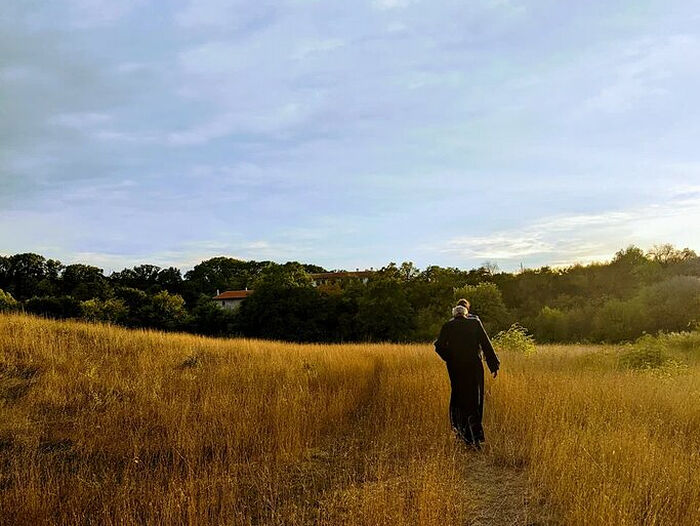
With its scale and space, this monastery is one of the largest monasteries in today's Bulgaria, but presently only has one monk due to the monastic vocations crisis in Bulgaria. The uniqueness of this place is complemented lastly by the well with holy water. It is reputed to have healing properties, and hundreds of sick pilgrims come here for it, especially on May 2, when the memory of St. Athanasius is celebrated. Patriarch Petros VII of Alexandria came in 2003 to the monastery to venerate his predecessor, who 1,659 years ago had prayed in this monastery and gifted an icon of St. Athanasius painted in Alexandria, which can be seen inside the main chapel. Despite its humble, largely unknown status within Orthodox Christianity, the Zlatnolivadenski Monastery was the grain of mustard seed for the future flourishing of monasticism in Europe (Matt. 13:31–32).3 This European monasticism was first fed from the spiritually flowering deserts of Egypt and brought through the great spiritual might of St. Athanasius the Great, who continues to intercede for the Church in this difficult time that abounds with heresies threatening to divide the Church.
Troparion: Tone 3
You were a pillar of Orthodoxy, O Hierarch Athanasios, / supporting the Church with divine doctrines; / you proclaimed the Son to be of one Essence with the Father, / putting Arius to shame. / O Righteous Father, entreat Christ God to grant us great mercy.
Kontakion: Tone 2
Having planted the dogmas of Orthodoxy, / you cut out the thorns of false doctrine, / and multiplied the seed of faith with the rain of the Spirit; / therefore, we praise you O righteous Athanasios.
FONS AMORIS FONS DOLORIS
Mayo dulce mes de la Intacta
Venid y vamos todos con flores a María
Tengo en mi alma el capullo de una rosa florecida
Soy un anciano feliz
Mirando para los ailantos
Y las parras fecundas de racismos
es divina la razón de mi poesía
extra muros infernales
Del odio que nos cerca
Desgranándoos voy avemarías
Extasiado en el paisaje
De este valle nemoroso
Pleno de rumores
Las casas colgantes de Artedo
El sel, la pradería
Fons amoris fons doloris
No hay rosas sin espinas
Apuntálame esas flores
Derrumbadas sobre el macizo de colores
Llegaron los titiriteros a la aldea
Entremeses y antélanos
Calzarete el coturno, vida mía
Encarnada está la fruta en los pomares
Suzanne, para ti corto una rama
Amor de juventud
Amor de senectud
Que no envejece la palabra
Conservo aquellas cartas
Que escribía a Londres en un baúl
Aquellos dulces besos
Trocaronse en astillas
ERASMO PATRÓN DE LOS HUMANISTAS.
Si no te gusta Erasmo o eres fraile o eres asno solían decir los humanistas de Alcalá la que tuvo un talante más liberal y reformista a la sombra de Cisneros. Salamanca era otra cosa. Erasmo no tuvo buen cartel en España y el sentimiento era mutuo. Le dio calabazas al emperador que le ofrecía una mitra en Sicilia, no quiso nunca cruzar los pirineos. “Un obispado no vale lo que vale mi libertad”. Non placet Hispania.
No le gustaba España y aquí sus secuaces fueron muy perseguidos bajo la sospecha de herejes (los hermanos Valdés, el metropolita Carranza primado de Toledo y del autor de ese libro tan delicioso que es el Lazarillo lo publicó anónimo por miedo a la inquisición.)
Sin embargo, se hace lenguas de los ingleses a los que alaba sus costumbres, su mejor amigo fue Tomás Moro. Pasó los mejores años de su vida en Londres y se sorprendía de que en aquel país todo el mundo besase a todo el mundo. La Arcadia. La utopía. Mihi praestat Britannia quia suavis est sicut osculum.1 Le besaban los ingleses lo besaban las inglesas. Fue el primer anglófilo de la literatura universal pero toda su obra está en latín.
Su pasión eran los libros en cuya compañía en un rinconcito se sentía en compañía. Porque un libro es el mejor amigo. La frase es suya. Más muchos que pocos y cañuto más mejor. Te hacen ser tolerante y compasivo. Escribió mucho… cuanto más escribo más gusto y mejor lo hago. Amaba a los hombres pero lejos.
He aquí un hombre de pensamiento más que de acción. A man for all the seasons como su amigo Moro.
De la huida y del andar de acá para allá hizo un lema vital. Erasmo fue un holandés errante. Siempre anduvo con la mosca en la oreja y a la espantadiza. Una de cal y otra arena. Corrían tiempos recios y no era bien quisto sobre todo en España y en Italia. Donde Scaligero le larga sus buenas andanadas tachándole de epicúreo y sibarita.
Para la escuela de Salamanca siempre fue sospechoso de herejía y la Sorbona le declara persona non grata por haber criticado a la escolástica que enseña a discutir y a regañar pero no a razonar.
Le salvó su ética, su pasión por el centro-virtus in medio est- y su sentido del humor que fue el mejor contraveneno para vivir aquellos lustros emponzoñados. Cruzó media Europa cabalgando en mulas prestadas cargadas de libros y en Dover le confiscan todo el dinero que llevaba los aduaneros ingleses que para esto son muy suyos- Erasmo no había leído a Shakespeare que conocía bien a sus paisanos2. No obstante lo cual no mermó nunca la anglofilia de Erasmo que acababa de escribir “La educación del Príncipe” tomando por modelo a Enrique VIII.
Siempre tenía frío, escribía sin parar. No es lo que se dice un religioso modelo. No decía misa todos los días y “se fumaba” el coro siempre que podía. Pero pocos humanos han penetrado en la grandeza de la obra y la figura de Cristo como él. Sus libros cobran una singular relevancia en estos tiempos tan parecidos a los del siglo XVI, de reformas, de nuevos inventos.
Es por lo que merecería tener un lugar en los altares.
continuará
1 Me gusta Inglaterra y su campiña que son suaves como un beso
2 Tienen la cara de ángeles y el alma de diablos. William Shakespeare sobre los ingleses.